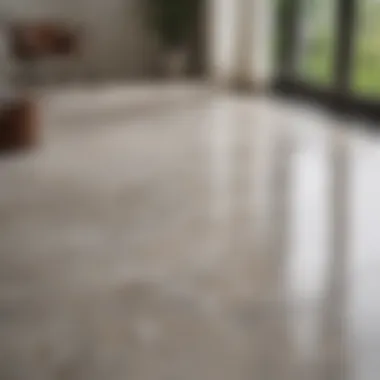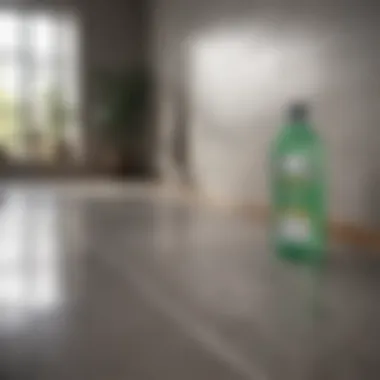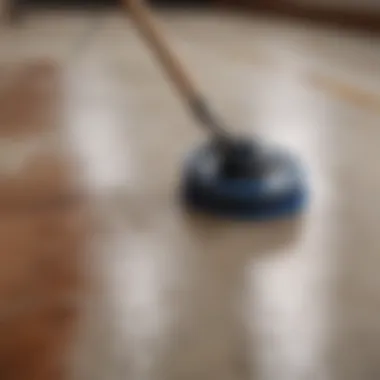Top Porcelain Tile Floor Cleaners Reviewed


Intro
Cleaning porcelain tile floors requires an understanding of the materials and products that work best for their care. As homeowners and renters strive to maintain the beauty of their spaces, the choice of cleaner becomes crucial. The right product not only enhances the shine and longevity of the tile but also ensures the safety of those living in the home. This guide will provide insights into effective cleaning methods, environmental considerations, and product recommendations for keeping porcelain floors in pristine condition.
Key Insights and Trends
Porcelain tiles have gained significant popularity in recent years. Their resilience and aesthetic appeal make them a preferred choice for many interior spaces. This section will highlight some key trends related to the care of porcelain tiles.
Current Trends in Interior Design
Today, interior design trends lean towards minimalism and sustainability. Porcelain tiles available in various colors and textures can complement these design choices. Many homeowners are looking for easy-to-clean surfaces, especially in high-traffic areas like kitchens and living rooms. As a result, the demand for effective and eco-friendly cleaning solutions is rising.
Growing Preference for Eco-Friendly Products
Consumers are increasingly aware of the impact of cleaning products on health and the environment. Many seek biodegradable and non-toxic cleaners for their homes. This shift underscores the importance of examining not only what cleaners work best but also how they impact the world around us. Choosing environmentally safe products is essential for home care and personal health.
"A clean home is crucial, but it should not come at the cost of a healthy environment."
Practical Tips for Porcelain Tile Care
Cleaning porcelain tiles does not have to be complicated. Following certain best practices can make the process efficient and effective.
Step-by-Step Cleaning Process
- Dust and Sweep: Begin by removing dust and debris with a broom or vacuum.
- Select Cleaner: Choose a pH-neutral cleaner specifically designed for porcelain tiles. Avoid acidic or abrasive cleaners, as these can damage the finish.
- Mop the Floor: Dilute the cleaner according to the label directions and mop the floor thoroughly, ensuring even coverage.
- Rinse: After mopping, rinse the floor with clean water to remove any residue from the cleaner.
- Dry: Use a soft cloth to dry the surface, preventing water spots.
Maintenance Tips
- Use Area Rugs: Placing rugs in entryways can prevent dirt from being tracked onto your porcelain tiles.
- Avoid Harsh Scrubbing: Always use a soft mop or cloth to prevent scratching the surface.
- Regular Cleaning: Engage in routine maintenance, as this prevents dirt build-up and prolongs the tile’s life.
Understanding Porcelain Tile
Understanding porcelain tile is critical for anyone looking to maintain their floors effectively. This section provides insights into the unique composition and qualities that make porcelain tiles distinct. Grasping these fundamentals is key to selecting the right cleaning methods and products that will not only preserve the tiles' appearance but also their integrity. Porcelain is known for its durability and resistance to moisture, which makes it a popular choice for various residential and commercial applications.
What is Porcelain Tile?
Porcelain tile is a type of ceramic tile that is fired at higher temperatures, which makes it denser and more durable than standard ceramic. It is widely recognized for its low porosity, making it less susceptible to stains. The manufacturing process involves mixing clay, feldspar, and kaolin, which are shaped into tiles and then kiln-fired. This results in a product that is hard and can withstand heavy foot traffic.
Characteristics of Porcelain Tile
Porcelain tile possesses several key characteristics that distinguish it from other flooring options:
- Durability: Porcelain tiles can withstand significant wear and tear. They are less likely to chip or crack, making them ideal for high-traffic areas.
- Water Resistance: The low porosity of porcelain means it is highly resistant to moisture absorption, which helps prevent mold and mildew growth.
- Aesthetic Variety: These tiles come in a wide range of designs, colors, and textures. This versatility allows them to mimic natural stone or wood, fitting into various interior design styles.
- Ease of Maintenance: Porcelain is easy to clean, needing only regular sweeping and occasional mopping with a suitable cleaner to maintain its shine.
Common Uses of Porcelain Tile
Porcelain tile is versatile and can be used in numerous applications:
- Residential Flooring: Its durability and aesthetics make it perfect for living rooms, kitchens, and bathrooms.
- Commercial Spaces: Businesses often opt for porcelain due to its ability to withstand heavy foot traffic.
- Outdoor Use: Certain types of porcelain tiles are suitable for outdoor patios and walkways, thanks to their frost resistance.
- Wall Covering: Porcelain tiles can also be used on walls, offering a stylish and easy-to-clean surface.
Importance of Proper Cleaning
Cleaning porcelain tile is more than just a chore. It serves several critical purposes that homeowners often overlook. Understanding the importance of proper cleaning can help maintain the visual appeal and structural integrity of your flooring. This section highlights key factors that underline why regular and appropriate cleaning practices are essential.
Maintaining Aesthetic Appeal


Porcelain tiles, known for their sleek and polished finish, can quickly lose their charm if not regularly cleaned. Dirt and grime can accumulate on the surface, resulting in a dull appearance. Routine cleaning helps refresh your floors, preserving their original luster. This is especially important in high-traffic areas where footfall can lead to more visible wear.
Regularly cleaning your porcelain tiles ensures that they look good at all times. Using suitable cleaning products will restore shine without damaging the glaze. Moreover, a clean floor creates a welcoming environment for both residents and guests. Homeowners who take pride in their living spaces should prioritize keeping their porcelain tiles pristine.
Preventing Damage to Tile
Another crucial aspect of proper cleaning is damage prevention. Grime and dirt often contain abrasive materials that can scratch the surface of porcelain tiles. Additionally, some cleaners, particularly those with harsh chemicals, can cause discoloration or degradation of the tile finish.
Adopting gentle cleaning methods and using appropriate products can avert potential harm to the tiles. It's essential to avoid using steel wool or other abrasive tools during cleaning, as these can scratch the tiles rather than cleaning them. Proper cleaning also prevents the buildup of mold and mildew, which can etch away at the tiles over time if not addressed.
Enhancing Longevity of Floors
Proper maintenance plays a vital role in extending the lifespan of porcelain flooring. By consistently cleaning and caring for the tiles, homeowners can avoid the need for costly repairs or replacements. Regular cleaning helps to remove substances that can lead to deterioration, ensuring that the tile remains intact and functional for years.
Moreover, preserving your investment in porcelain tiles requires a thoughtful cleaning approach. This not only boosts the floors' longevity but also enhances overall home value. A well-maintained floor is appealing to potential buyers, providing a solid return on your investment.
"Taking the time to care for your porcelain tiles reflects your commitment to your home and ensures they remain a beautiful asset."
In summary, proper cleaning of porcelain tile is indispensable. It supports aesthetic appeal, prevents damage, and extends the life of your flooring. Recognizing its significance is crucial for any homeowner looking to maintain a beautiful and enduring living space.
Choosing the Right Cleaner
Choosing the right cleaner for porcelain tile floors is not merely a matter of aesthetics; it is crucial for maintaining the longevity and integrity of the flooring. Selecting an appropriate cleaning solution allows for optimal cleanliness without causing any damage. Improper cleaners can lead to scratches, dullness, or even discoloration. Therefore, understanding the right options available can prevent unnecessary costs and repair work in the future.
Considerations for Selection
Type of Stains
The type of stains on your porcelain tile floor can significantly influence your choice of cleaner. Different stains, such as grease, dirt, and hard water spots, may require unique approaches. For example, a degreaser would work well for kitchen stains, whereas a gentle pH-neutral cleaner would be better suited for general dirt. Recognizing this aspect helps in targeting the issue effectively.
A key characteristic of stain type is its nature; some stains are more stubborn due to their composition. The benefit of identifying the stain type is that it steers you toward a specific cleaning solution designed for that purpose, allowing for better results without excessive scrubbing or discomfort. Conversely, picking the wrong cleaner can exacerbate problems, making stains more challenging to remove.
Frequency of Cleaning
The frequency at which you clean your porcelain tile floors also plays a significant role in product selection. If your floors endure heavy traffic or are prone to accumulating dirt, more frequent cleaning is necessary. This may involve using stronger cleaners that tackle tougher dirt deposits.
A notable feature of regular cleaning is its ability to prevent stains before they set in. While using a gentle cleaner may suffice for less-used areas, utilizing a robust cleaner periodically is beneficial. Understand that heavier-duty cleaners may wear out tiles faster if used too frequently, requiring a balanced approach to maintain shine and prevent damage.
Environmental Impact
In today’s context, the environmental impact of cleaning products cannot be overlooked. Many consumers are leaning towards eco-friendly solutions that are biodegradable and non-toxic. Choosing cleaners that minimize harm to the environment reflects a conscientious decision.
This consideration not only helps in promoting sustainable practices but also ensures better air quality indoors. A unique aspect of eco-friendly cleaners is their formulation, usually derived from natural ingredients. Such cleaners may not always be as effective on tougher stains but offer safety and sustainability advantages. It’s essential to weigh the pros and cons when choosing between traditional and environmentally friendly products.
Comparing Cleaner Types
Chemical vs. Natural Cleaners
When comparing chemical and natural cleaners, one should consider effectiveness versus safety. Chemical cleaners often offer quick and powerful solutions for stubborn stains, making them popular among heavy-duty users. However, they can have health risks and leave behind harmful residues.
On the other hand, natural cleaners are generally safe for both humans and pets but may lack efficacy in tackling tougher cleaning jobs. A key characteristic of this comparison is the balance between immediate results and long-term health considerations. Evaluating your cleaning needs will guide you in selecting the right path, but understanding the possible trade-offs is crucial.
Specific Formulations
The market also offers specific formulations designed for distinct circumstances, such as concentrated cleaners or ready-to-use sprays. Recognizing the right formulation can simplify the cleaning process. Concentrates often require dilution, allowing for flexibility in strength and usage, while ready-to-use sprays offer convenience but may not be as economical.


Each formulation may carry advantages such as ease of use or lower price points, yet they often come with limitations regarding cleaning strength or versatility. An informed decision on the formulations you choose is vital to ensuring that your porcelain floors are clean and well-maintained.
Popular Porcelain Tile Floor Cleaners
In this section, we explore the different options available for cleaning porcelain tile floors. Choosing the right cleaner can greatly influence the outcomes of your cleaning routine. The right product not only ensures cleanliness but also helps to maintain the integrity of the tiles.
Top Commercial Products
Commercial cleaners are often formulated to deal with specific types of stains and dirt found on porcelain tiles. They provide convenience and can be very effective when used properly.
Brand A
Brand A is well-regarded for its effectiveness in removing tough stains from porcelain tiles. Its powerful formula targets grime without causing damage. A key characteristic of Brand A is its ability to work in both hot and cold water, making it adaptable for a variety of cleaning situations. The unique feature of this cleaner is its non-toxic formulation, which helps to protect the tile's surface while also being safe for households with pets and children. However, it is essential to test any new cleaner on a small area first, as not all tiles react the same way.
Brand B
Brand B has gained popularity due to its ease of use and accessibility. It comes in a ready-to-use spray format that simplifies the cleaning process. The key characteristic of Brand B is its fast-acting foam that penetrates dirt, making it suitable for quick clean-ups. One unique aspect is its pleasant scent, which leaves the area smelling fresh after cleaning. The downside, however, can be its price point, which is higher compared to some competitors, making it less ideal for regular use by budget-conscious individuals.
Brand
Brand C focuses on environmentally-friendly formulations. With a commitment to sustainable cleaning solutions, it appeals to those who prioritize eco-conscious choices. Its key characteristic is the absence of harmful chemicals, using plant-based ingredients instead. Its unique feature is a concentrated formula, which means users can dilute it according to their needs. However, some users report that the cleaner may not be as effective on heavy-duty stains, necessitating more frequent applications.
Effective Homemade Solutions
Homemade cleaning solutions often include common household ingredients, which can provide an economical and safe alternative to commercial products.
Vinegar and Water
A mixture of vinegar and water is often recommended for its effectiveness and simplicity. This solution is popular because it can naturally break down grease and dirt without harsh chemicals. The key characteristic of this method is its affordability and availability. The unique feature is the ability to adjust the vinegar-to-water ratio according to the cleaning needs. However, it is crucial to note that vinegar can be abrasive on grout and should not be used regularly for that area.
Baking Soda Paste
Baking soda paste is another effective homemade solution that can tackle tough stains. By mixing baking soda with water to form a paste, you get a gentle abrasive cleaner that helps lift stains effectively. This method is beneficial because it is safe for most surfaces and non-toxic. The unique feature is its versatility, as it can be adjusted for thick or thin consistency based on the stubbornness of the stain. However, using baking soda on highly polished tiles might dull the finish, so caution is advised.
Correct Cleaning Techniques
Cleaning porcelain tiles effectively is crucial for maintaining their appearance and durability. Correct cleaning techniques not only enhance the aesthetic appeal of the tiles but also contribute to the longevity of the installation. A proper method ensures that dirt and stains are effectively removed without damaging the tile surface. Neglecting this can result in long-term issues such as scratches or discoloration. Thus, investing time and effort into mastering the right cleaning techniques proves beneficial.
Step-by-Step Cleaning Process
Preparation
Preparation is often overlooked but serves as a vital first step in cleaning porcelain tiles. It involves gathering the necessary tools and materials. Ensure to have a suitable cleaner, a mop, and other cleaning tools ready. This part of the process contributes to efficiency during the cleaning session. A key characteristic of preparation is its role in mitigating potential damage; for instance, using the right cleaner prevents unwanted chemical reactions on the tile surface. One unique feature of thorough preparation is the identification of high-traffic areas that may need extra attention. Without it, one risks spreading dirt around instead of removing it.
Application
Application refers to the method of employing the cleaner onto the tiles. A popular choice for this process is to use a mop or cloth to evenly distribute the cleaner. This ensures that the solution reaches all sections of the floor effectively. A key takeaway about application is its importance in addressing specific stains or dirt types. By focusing on soiled areas, one maximizes cleaning effectiveness. However, a downside might be the potential for over-saturation, which can lead to slippery surfaces. Using the correct amount of cleaner will help mitigate this issue.
Rinsing
Rinsing plays an essential role in removing residues left by cleaning solutions. Following the application of any cleaner, it is critical to rinse the surface with clean water. This step is beneficial as it prevents any build-up of cleaning products that can dull the tile's finish over time. A distinctive feature of rinsing is its impact on preserving the shine and clarity of the porcelain tiles. Not rinsing properly can lead to unsightly streaks or a hazy appearance on the tile surface. Therefore, it is advisable to ensure that the area is thoroughly rinsed, leaving a clean and smooth finish.
Common Mistakes to Avoid
Using Harsh Chemicals


One significant mistake in cleaning porcelain tiles is the use of harsh chemicals. These substances can damage the surface of the tiles over time. They might make the floor look clean initially, but prolonged exposure can result in dullness or scratches. A main characteristic of using harsh chemicals is that they often provide immediate gratification with their strong cleaning power. However, they can be detrimental in the long run. The unique downside is that many harsh cleaners contain ingredients that can be hazardous to indoor air quality. Choosing milder, eco-friendly alternatives can yield better results with less risk.
Incorrect Tools
Using incorrect tools is another common misstep. For instance, abrasive scrubbers can scratch the porcelain surface, leading to permanent damage. A key characteristic of using the right tools is ensuring they are compatible with porcelain tiles. Using the wrong ones can lead to ineffective cleaning or injury to the tiles. The unique feature here is that the choice of tool can either enhance or impede the effectiveness of your cleaning regimen. Therefore, it’s important to select tools specifically designed for delicate surfaces like porcelain to avoid causing harm.
Environmental Considerations
Understanding the environmental implications of cleaning products is crucial for any homeowner. The cleaning process should not only focus on aesthetics but also consider the health of the environment. Using harsh chemicals can lead to pollution in our water systems and contribute to indoor air quality issues. This section explores eco-friendly cleaning options and their broader impacts on indoor air quality.
Eco-Friendly Cleaning Options
When it comes to cleaning porcelain tiles, there are various eco-friendly options to consider. These alternatives use natural ingredients that are less harmful to both the environment and human health. Common eco-friendly solutions include:
- Vinegar and Water: A classic, simple mixture that is effective in cutting through grime without harmful side effects.
- Baking Soda Paste: A gentle abrasive that can eliminate tougher stains while remaining safe for the environment.
- Essential Oils: Adding a few drops of essential oils like tea tree or lavender not only provides a pleasant scent but can also add antibacterial properties to your cleaning solution.
These cleaning solutions not only help in maintaining your tiles but also reduce the overall environmental footprint associated with harsh chemical cleaners. By choosing green options, you support sustainable practices in your home.
Impact on Indoor Air Quality
The use of traditional cleaning products often contains volatile organic compounds (VOCs) that can adversely affect indoor air quality. These compounds can evaporate quickly into the air, potentially leading to health issues such as headaches or respiratory problems. In contrast, eco-friendly cleaners typically contain fewer VOCs or none at all, making them a more suitable choice for maintaining a healthy living environment.
In addition to improving air quality, using natural cleaners can enhance the overall ambiance of your home. Many synthetic fragrances in commercial cleaners can also trigger allergic reactions or irritate sensitive individuals. Eco-friendly solutions, on the other hand, offer natural scents that do not compromise health.
"Choosing eco-friendly cleaning products not only nurtures the environment but also fosters a healthier indoor space for all occupants."
Maintaining Your Porcelain Floor
Maintaining porcelain floors is essential for both aesthetic appeal and practical longevity. These tiles are a significant investment in any home, and their upkeep can determine how long they last while retaining their brand-new look. Regular maintenance not only enhances the beauty of the tiles but also secures their structural integrity. With proper care, homeowners can avoid costly repairs and replacements in the future. The focus here is on the habits and methods that ensure porcelain tiles remain clean, stylish, and functional.
Regular Maintenance Tips
To keep porcelain tiles in optimal condition, incorporate these regular maintenance practices into your routine:
- Sweep Daily: Use a soft-bristled broom or a microfiber dust mop to collect dust and dirt. This daily cleaning helps prevent scratches that can occur from debris on the surface.
- Mop Weekly: A damp mop helps to remove grime and sticky residues. Use a cleaner specifically designed for porcelain tiles, or a solution of warm water and a few drops of mild dish soap.
- Spot Clean as Needed: If spills occur, clean them immediately to prevent stains. A gentle cloth should suffice, dab away excess liquid, then follow with a suitable cleaner for the type of stain.
- Avoid Abrasives: Steer clear of harsh scrubbing pads or cleaners that can dull the surface of your porcelain tiles. Always choose products that are safe for tile finishes.
By following these simple practices, you can ensure that your porcelain floor remains in pristine condition.
When to Deep Clean
Deep cleaning should be undertaken less frequently but is vital for maintaining porcelain tiles' appearance and hygiene. Here are some signs that indicate it’s time to deep clean:
- Visible Staining: If there are noticeable stains that regular cleaning cannot remove, it is time for a deeper approach.
- Grout Discoloration: Grout may become darkened or stained over time. A deep clean can lift these stubborn stains, restoring the look of your tiled area.
- High Foot Traffic: Areas that experience heavy foot traffic, such as entryways or kitchen floors, require deep cleaning at least quarterly to cope with accumulated dirt and grime.
- Recent Renovations: After home repairs, dust and residue can settle on floors. A thorough clean will eliminate this debris and restore the floor's shine.
Deep cleaning techniques can include steam cleaning or using specialized tile and grout cleaners. Implementing these practices at appropriate intervals not only preserves the visual appeal of your porcelain flooring but also extends its life.
End
Cleaning porcelain tiles is not merely a chore; it is an essential practice that enhances both the life and look of your floors. This article presents various aspects of cleaning porcelain tile effectively, focusing on practical techniques, environmental considerations, and product recommendations.
Final Thoughts on Cleaning Porcelain Tile
As you maintain your porcelain floors, remember that the right cleaner plays a vital role. It’s crucial to select a product that matches the characteristics of your tile and the specific stains you encounter. Regular cleaning can prevent dirt accumulation and maintain visual appeal. Remember, a clean floor reflects a well-kept home atmosphere.
While discussing cleaning, it's equally important to consider how the cleaning process impacts the environment. Opting for eco-friendly options not only ensures a safer home but also promotes sustainability.
Recommendations for Product Use
When choosing a cleaner, here are a few recommendations:
- Commercial Cleaners: Products such as Bona Hard-Surface Floor Cleaner or Zep Neutral pH Floor Cleaner are effective for general cleaning and keeping the shine intact.
- Homemade Solutions: For an economical approach, a mix of vinegar and water can combat light stains. Baking soda paste is great for scrubbing tougher spots without damaging the glaze.
- Avoid Harsh Chemicals: Always steer clear of bleach and ammonia-based cleaners as they may damage the finish of your floor.



